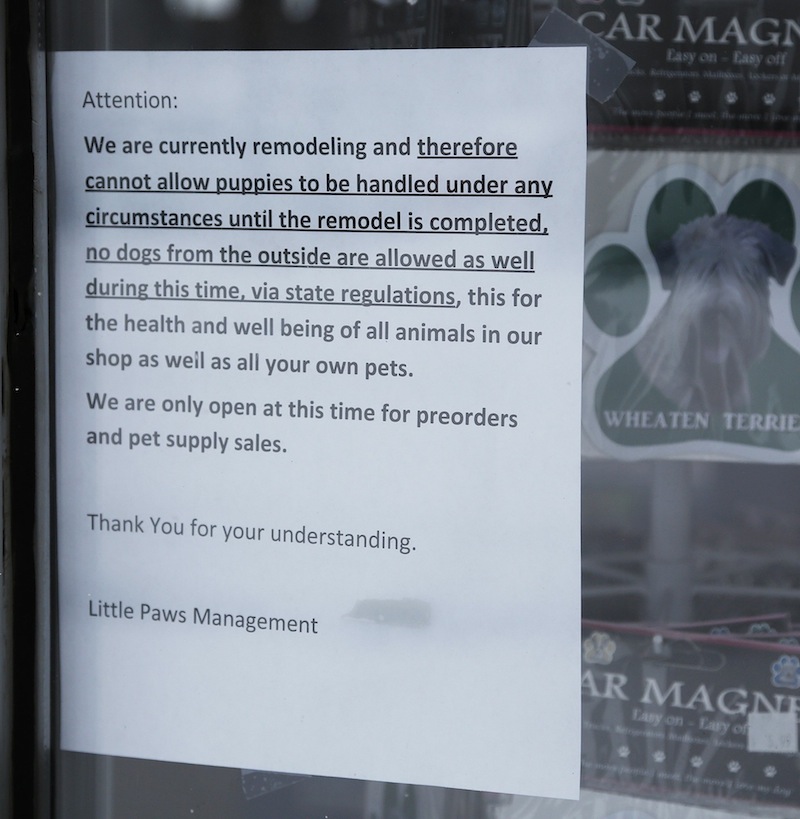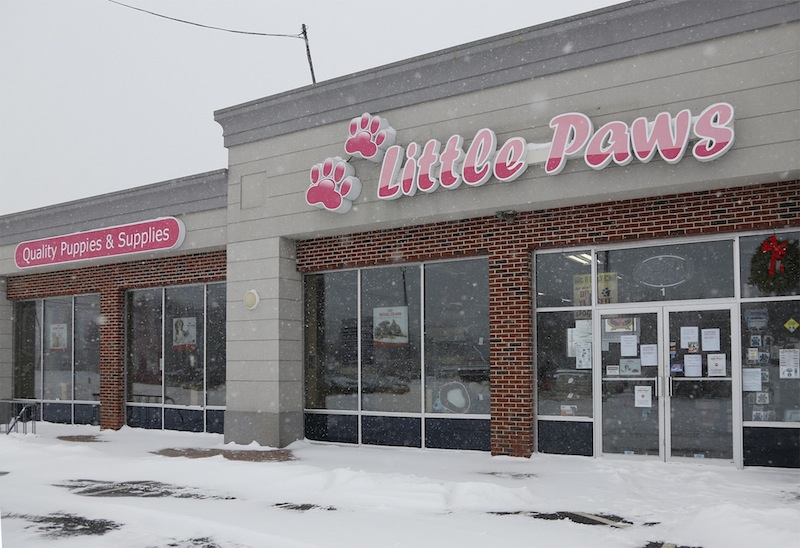SCARBOROUGH — State officials have ordered a pet shop in Scarborough to quarantine its puppies because a young Siberian husky tested positive for parvovirus and died soon after it was purchased from the store.
The animal welfare division of the Department of Agriculture, Conservation and Forestry was notified Feb. 1 that a puppy sold at the Little Paws Pet Shop on Payne Road had parvovirus, said Liam Hughes, the state’s director of animal welfare.
Parvovirus is a highly contagious and potentially fatal disease for dogs. The young dog also tested positive for giardia, an intestinal parasite.
The store’s puppies are under quarantine until at least Monday, Hughes said. A veterinarian will visit the store Monday to retest the dogs and decide whether the quarantine can be lifted.
The state did not order the store closed during the quarantine, although it was closed Friday because of the snowstorm, its owner said.
Julie Thomas of Madison, N.H., said the Siberian husky puppy, Shelby, was fine when she brought her home from the pet shop. Thomas said she continued the dog’s booster shots on schedule.
On the fourth night after she brought Shelby home, Thomas said, the puppy was lethargic and throwing up.
The next morning, she brought Shelby to a veterinarian in Fryeburg who diagnosed the puppy with parvovirus and giardia.
“I was in tears because I know what (parvovirus) can do to a puppy,” Thomas said.
Shelby stayed at the veterinary clinic, but was so sick two days later that Thomas knew the puppy probably wouldn’t recover.
While Shelby was being treated, Thomas contacted the Little Paws Pet Shop and the state’s animal welfare division.
Thomas said the pet shop told her she could bring the puppy back for a full refund of the $1,299 purchase price, but she couldn’t do that because the dog was too sick.
State officials then told Thomas that she could surrender the dog to the pet shop without removing her from the veterinary clinic, she said.
Thomas did that and was notified the next day, Feb. 2, that Shelby had died.
“I know seven days doesn’t seem like a lot, but Shelby was already part of our family,” Thomas said. “It just tore us apart.”
Hughes, the director of animal welfare, said the state contacted 12 to 15 people who bought dogs from the Little Paws Pet Shop recently.
“We wanted to let them know the puppies they have recently purchased were in the store at the same time the sick puppy was,” Hughes said. Owners were advised to contact their veterinarians to discuss vaccines and symptoms.
Barbara Cross, the shop’s owner, said she also contacted customers who bought puppies in the past few weeks, to find out whether the animals were sick. No other owners reported sick dogs, and the 23 dogs in the store are not sick, she said Friday.
The puppy that died left the store on Jan. 23 and became sick on Jan. 30, she said. The puppy had been vaccinated, Cross said.
“If that dog did have parvovirus, perhaps it caught it under the care of its owner,” she said.
Cross and her employees have sanitized all kennels, equipment and surfaces, she said.
Hughes said the state will try to find out where the puppy got exposed to parvovirus and giardia so officials can try to stop it from spreading to other dogs. Canine parvovirus does not spread to people.
Parvovirus appears to be more common in warmer climates, but it is seen in Maine, said Dr. Carolyn Radding of the Freeport Veterinary Hospital.
Radding said parvovirus is highly contagious and can spread from animal to animal through fecal-oral contamination. Puppies younger than 16 weeks appear to be most susceptible.
Infected dogs often require “very intensive and very expensive” medical intervention to keep them alive, she said.
“It’s such a worry because it causes really severe bloody diarrhea and vomiting. Dogs can often die of dehydration and blood loss and other complications because of the severity of the illness,” Radding said.
The best way to protect dogs against parvovirus is through vaccinations, Radding said.
Dr. Nellie Savage of the Brackett Street Veterinary Clinic in Portland said puppies begin showing symptoms of parvovirus within three to five days of being exposed.
She said owners should avoid bringing young puppies to dog parks or around large groups of dogs until they are fully vaccinated.
Giardia, an intestinal parasite, also can cause severe diarrhea and dehydration in dogs, but it is rarely fatal. The parasite can spread to humans and cause health problems in people with compromised immune systems.
Savage said people can be exposed to giardia when they handle dog feces.
Lynn Farcassi of Maine Citizens Against Puppy Mills said members of the organization regularly protest outside pet stores, including Little Paws, saying they buy puppies from large-scale breeding facilities — often called puppy mills — in the Midwest.
“The veterinary care at these places is nonexistent,” she said.
Cross, the owner of Little Paws, said she avoids puppy mills by interviewing breeders about the conditions in which they breed dogs and getting photos of those facilities.
“I don’t believe any of my puppies come from puppy mills,” she said. “I would never want to support them. I try my best to make sure I’m not.”
Gillian Graham can be contacted at 791-6315 or at:
ggraham@pressherald.com
Twitter: grahamgillian
Send questions/comments to the editors.






Comments are no longer available on this story